Ministry of Defence
Armed Forces shape future roadmap at Combined Commanders’ Conference 2025
प्रविष्टि तिथि:
17 SEP 2025 4:03PM by PIB Delhi
The Combined Commanders’ Conference (CCC) 2025 was conducted by the Armed Forces in Kolkata, West Bengal from September 15 to 17, 2025. As the apex-level forum of the Armed Forces, the conference brought together the highest decision-makers from the Ministry of Defence and the three Services to foster strategic & conceptual dialogue. The CCC plays a pivotal role in shaping the Armed Forces’ future roadmap, enhancing jointness, guiding capability development and ensuring alignment with national security priorities. This year’s theme ‘Year of Reforms - Transforming for the Future’ reflected a focused agenda to prepare the forces for emerging challenges.
Prime Minister Shri Narendra Modi and Raksha Mantri Shri Rajnath Singh graced the conference, lauding the exemplary dedication of the Armed Forces in safeguarding the Nation. They underlined the need for continuous reforms and technological self-reliance, particularly emphasising indigenous development in defence technology and manufacturing.
The conference commenced with a high-impact demonstration by the Joint Operations Command Centre, followed by a live Air Defence demonstration showcasing state-of-the-art capabilities in air surveillance, missile defence and counter-drone operations. This was followed by vibrant discussions on the evolving character of future warfare, examining the shifting paradigms of multi-domain operations in the context of rapid technological advancements. A comprehensive review of major reforms of the last two years and transformational steps was carried out by Chief of Defence Staff (CDS) General Anil Chauhan which provided clarity on progress achieved.
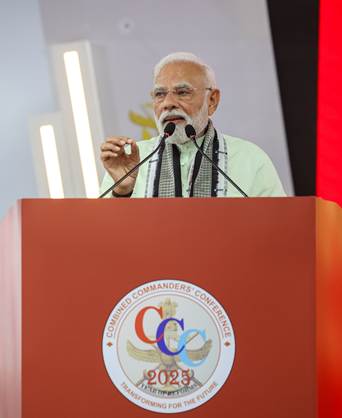
The Prime Minister delivered an inspiring address focusing on the strategic vision for the Armed Forces. He emphasised on Jointness, Aatmanirbharta and Innovation for enhanced operational readiness of the Armed Forces.
Raksha Mantri presided over a pivotal session which included an in-depth performance review of current force readiness, capability development and a strategic roadmap for future wars. Special attention was given to the impact of the current geopolitical flux on India’s security environment, emphasising the need for agility, resilience and foresight in defence planning.
Day-2 delved deeply into the growing importance of information warfare. The official release of the ‘Joint Military Space Doctrine’ marked a key milestone in institutionalising this domain as a part of national security strategy.
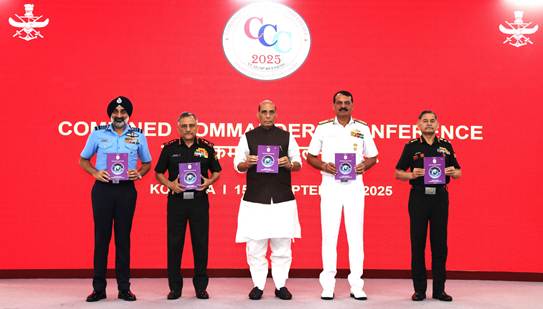
Subsequent sessions facilitated a robust open forum discussion on the strategic neighborhood, analysing the evolving security dynamics across India’s borders and beyond. Critical issues relating to procurement processes, financial powers delegation, and the challenges faced by the Armed Forces in acquiring state-of-the-art equipment were debated, with a view to enhancing efficiency and promoting transparency. The performance and future trajectory of the Ex-Servicemen Contributory Health Scheme were also reviewed, underlining that the welfare of personnel and veterans remained our central focus.
The day witnessed valuable remarks by Raksha Mantri, wherein he exhorted the Armed Forces to go beyond the traditional concepts of war and remain alert & ready to deal with invisible challenges emanating from unconventional threats such as information, ideological, ecological and biological warfare. In view of the turbulent global order, regional instability and the emerging security landscape, Raksha Mantri emphasised the need for constant assessment of the changes taking place across the globe, and its impact on the security system of the country.
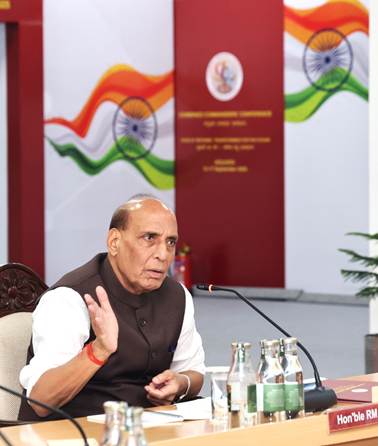
It was followed by a session led by Headquarters Integrated Defence Staff, which deliberated on translating strategic vision into actionable plans, defining the future roadmap and turning vision into executable outcomes.
Day-3 focused on understanding emerging threats and future challenges in a rapidly evolving security landscape. An insightful session by the CDS provided a detailed update on the Year of Reforms, elaborating on the action plans formulated in line with the Prime Minister’s and Raksha Mantri’s directions.
The discussion emphasised on enhancing jointness and integration across the Services, fostering interoperability, streamlining decision-making and reforming institutional structures for space, cyber, information and special operations domains. The session underlined the critical importance of adopting a technology-led approach to modern warfare, with innovations integrated seamlessly into operational doctrine.
The conference concluded with the CDS’ remarks as he summarised key outcomes and reiterated the commitment of the Armed Forces to continually transform in order to remain agile, self-reliant and future-ready. He highlighted the need to institutionalise reforms as an ongoing process, aimed at preparing the Forces to effectively tackle challenges in an increasingly complex global environment.
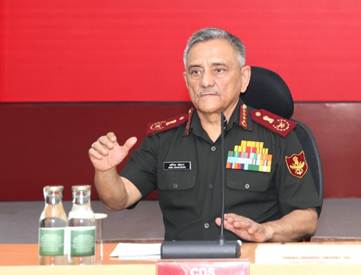
The successful conduct of CCC 2025 marks a major step in transforming the Armed Forces into a more integrated, technologically advanced, and operationally agile force - fully capable of addressing multi-domain threats, safeguarding national interests and contributing to nation building, global peace and stability.
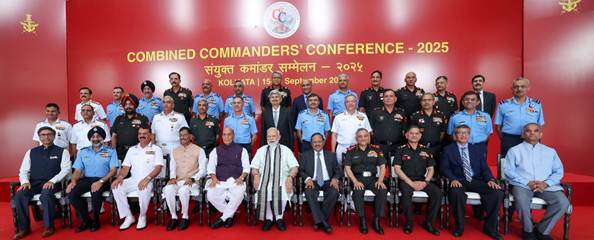
***
VK/Savvy
(रिलीज़ आईडी: 2167585)
आगंतुक पटल : 933